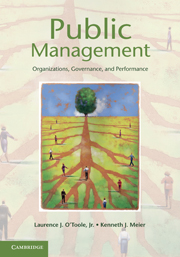Book contents
- Frontmatter
- Contents
- List of figures
- List of tables
- Preface
- 1 Public management and performance: an evidence-based perspective
- 2 A model of public management and a source of evidence
- 3 Public management in interdependent settings: networks, managerial networking, and performance
- 4 Managerial quality and performance
- 5 Internal management and performance: stability, human resources, and decision making
- 6 Nonlinearities in public management: the roles of managerial capacity and organizational buffering
- 7 Public management in intergovernmental networks: matching structural networks and managerial networking
- 8 Public management and performance: what we know, and what we need to know
- Glossary
- References
- Index
8 - Public management and performance: what we know, and what we need to know
Published online by Cambridge University Press: 05 June 2012
- Frontmatter
- Contents
- List of figures
- List of tables
- Preface
- 1 Public management and performance: an evidence-based perspective
- 2 A model of public management and a source of evidence
- 3 Public management in interdependent settings: networks, managerial networking, and performance
- 4 Managerial quality and performance
- 5 Internal management and performance: stability, human resources, and decision making
- 6 Nonlinearities in public management: the roles of managerial capacity and organizational buffering
- 7 Public management in intergovernmental networks: matching structural networks and managerial networking
- 8 Public management and performance: what we know, and what we need to know
- Glossary
- References
- Index
Summary
This book has presented a perspective, a model, and a large set of empirical findings. The results speak to a broad agenda occupying many scholars and practitioners: understanding how public managers shape agency and program performance. In this chapter we draw the volume to a close by undertaking two tasks. First, we review and tie together what we have learned about public management and performance. We then sketch a new agenda for some of what, we believe, remains to be explored.
What does the evidence show?
This research program has developed many findings about whether, how, and how much public management influences the performance of public organizations. Most findings explain what is going on in school districts within one state; but, we argue strongly, this “limitation” should not diminish the record. Although this work should be replicated in other empirical settings – and although we have initiated that ourselves, as have others discussed in earlier chapters – the patterns analyzed here should not be marginalized. First, the sample included in most of our empirical studies consists of more than 1 percent of all governments in the United States. Second, no larger sample of public organizations has ever been analyzed for determinants of performance. Third, the analyses develop and report on numerous types of managerial influence. While the findings sometimes show that managers shape performance in ways that some might find to be expected, the results do not merely theorize or speculate about such channels of influence; they demonstrate the influence with systematic evidence.
- Type
- Chapter
- Information
- Public ManagementOrganizations, Governance, and Performance, pp. 267 - 286Publisher: Cambridge University PressPrint publication year: 2011



